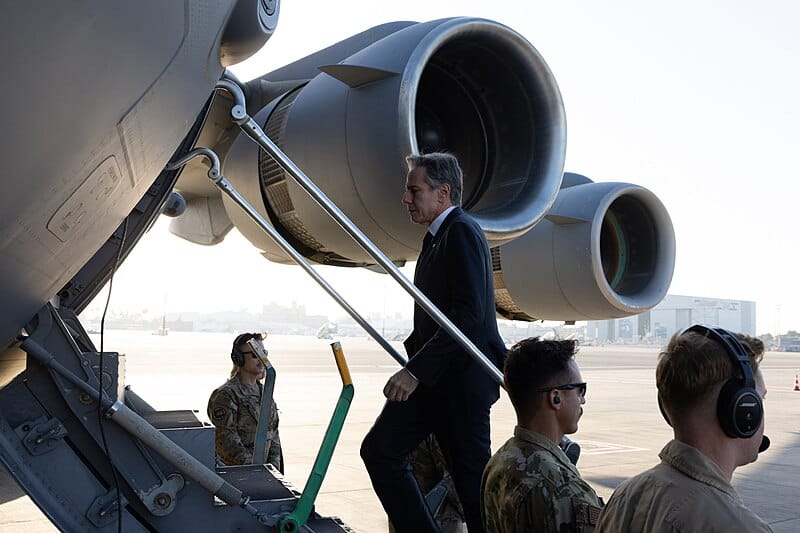An Administration In Need of A Diplomat

You can feel the tension build by the day. The world is embroiled in two hot wars: the War in Ukraine and the War in Gaza. These two conflicts continue to escalate almost by the hour. What was considered unthinkable is now accepted as the latest strategy in a long march that threatens to become global.
Washington is the common denominator in both conflicts. Without the White House’s military and financial support, neither Kyiv nor Tel Aviv could continue to battle.
What is most concerning about both of these conflicts is the chance that they might first evolve into a regional and then global confrontation, a confrontation that would include the two major nuclear arsenals of the United States and the Russian Federation.
And this isn’t just our imagination.
Speaking before the “Arms Control Association” on June 8th, Pranay Vaddi, the Special Assistant to the President and the Senior Director for Arms Control, commented:
“Absent a change in adversary arsenals, we may reach a point in the coming years where an increase from current deployed numbers is required. We need to be fully prepared to execute if the president makes that decision.”
https://nuclear-news.net/2024/06/11/1-b1-us-issues-major-nuclear-weapons-alert-amid-fears-of-all-out-war-if-that-day-comes/
That’s our country’s chief arms reduction negotiator telling us that it looks like we’ll need more “nucs” as tensions around the world continue to escalate.
However, an all-out nuclear confrontation does not have to be inevitable; there is a long-standing alternative. An alternative that involves the leading member of a President’s Cabinet, the Secretary of State. Since Thomas Jefferson, the country’s first Secretary of State, has been the nation’s lead diplomat.
The Secretary of State is the official spokesperson of the US Government with other foreign countries. Twice in the State Department’s listing of SOS duties, “negotiation” is listed as this person’s chief role.
The SOS:
Conducts negotiations relating to U.S. foreign affairs;
and,
Negotiates interprets and terminates treaties and agreements.
https://www.state.gov/duties-of-the-secretary-of-state/
Regrettably, the negotiation tables have been empty since President Biden and SOS Blinken have taken their respective offices.
The Afghanistan withdrawal presents a vivid example of how these two operate. In February 2020, under then-President Trump, the US and the Taliban negotiated a deal in Doha, Qatar, that called for a reduction in hostilities. It was the first step in what would become the US withdrawal.
Nearly a year later, the Biden Administration took office. For the next four months, there were no official negotiations between the US and the Taliban. Then, on April 14, 2021, President Biden announced his decision to withdraw American troops. The day after that announcement, SOS Blinken flew to Kabul. ABC News notes that talks with the Taliban had been “on ice” until then.
https://abcnews.go.com/Politics/blinken-visits-afghanistan-bidens-withdrawal-decision-press-diplomacy/story?id=77079705
As anyone who has ever participated in any negotiation will tell you, this is precisely backward. The first rule in any successful negotiation is to bring all parties around the table. Talk. Discuss each party’s aims and objectives. Then, make every effort to reach a mutually inclusive agreement.
But that’s not how the Biden Administration operates. Decisions are made in the Biden White House, and only then is the SOS sent out to “sell” that decision to the other side. In today’s multi-polar world, this imperious attitude is highly counterproductive.
Another example of the Biden White House’s approach to the international crisis was its response to the Ukraine War. Discussions between President Biden and President Putin were limited before the War began. I believe there had only been two “Skype calls.” But after Russian troops crossed into Ukraine, discussions between the two Presidents ceased.
It was a perfect opportunity for the respective Secretaries of State, Sergei Lavrov and Antony Blinken, to talk. Perhaps at the number two level, a resolution could begin.
For over a year, Blinken avoided meeting with Lavrov. Finally, at the occasion of the G20 Meeting, when both were scheduled to be in attendance, Blinken met his Russian counterpart face-to-face. Blinken relates that his only comment to Lavrov was, “ End this war of aggression.” This is a remarkable demonstration of Blinken’s diplomatic acumen.
https://www.bbc.com/news/world-asia-india-64825198
While Blinken is reluctant to visit rival countries, such as Russia, he apparently relishes visits to more friendly nations. Since assuming his position as Secretary of State, Blinken has made nine visits to Israel, most of any country. He has a great affinity for the Netanyahu government.
But like the conflict in Ukraine, any negotiations aimed at ending the conflict in Gaza are strictly one-sided.
Two weeks ago, SOS Blinken traveled to Doha, Qatar, to negotiate with the key Hamas mediators to seek the much-discussed cease-fire. It was all part of a two-day, four-country tour of the Middle East. Arriving for negotiations on Wednesday, June 12th, he departed a couple of hours later. He stayed just long enough for a cup of coffee and a photo op. A profound opportunity to discuss, at length, the objectives for peace with the Hamas representatives was missed. Blinken was in too much of a hurry for his next meeting. Perhaps Blinken was not interested in hearing from Israel’s enemy in the Gaza conflict.
By words and deeds, Secretary of State Blinken has demonstrated a reluctance to open a dialog with both sides in today’s greatest conflicts: Ukraine and Gaza. He is unable or unwilling to spend time with the Russians or Hamas, and without engaging with them, a peaceful settlement will be out of reach.
As these two conflicts continue to escalate, we may all learn the bitter lesson of Prussian General Carl von Clausewitz, who expressed more than a century ago that the alternative to diplomacy is war.